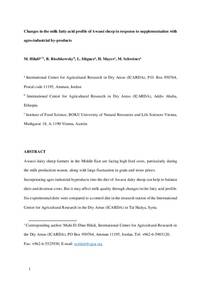Changes in the milk fatty acid profile of Awassi sheep in response to supplementation with agro-industrial by-products

Authors:
Awassi dairy sheep farmers in the Middle East are facing high feed costs, particularly during the milk production season, along with large fluctuation in grain and straw prices.
Incorporating agro-industrial byproducts into the diet of Awassi dairy sheep can help to balance diets and decrease costs. But it may affect milk quality through changes in the fatty acid profile. Six experimental diets were compared to a control diet in the research station of the International Center for Agricultural Research in the Dry Areas (ICARDA) in Tal Hadya, Syria.
Milking Awassi ewes (n = 56) were used to test six experimental diets, in which supplements comprised molasses, sugar beet pulp, or cotton seed cake to a traditional control diet contained barley, wheat bran, and barley straw. Milk samples were collected on a weekly basis from April to June.
The daily milk production and fat content were enhanced in diets containing urea-treated wheat straw (P < 0.01). The vetch-based diet resulted in a remarkable increase in C6:0, C8:0, C10:0, C12:0, C14:0, and decrease in C18:0 and C20:0 (P < 0.01). An increase in C6:0, C8:0, and C10:0 was also observed in diets containing molasses and sugar beet pulp (P < 0.01). Monounsaturated fatty acids (MUFA) increased by 10% with cotton seed cake-based diets, whereas it decreased by 25% in the vetch-based diet (P < 0.01). Polyunsaturated fatty acids (PUFA) increased in five diets by 10–19%, compared to that of the control group (P < 0.01). This study provides evidence that supplementation using agro-industrial by-product feed stuff influences milk fatty acids profile and therefore enhances potential health benefits.
